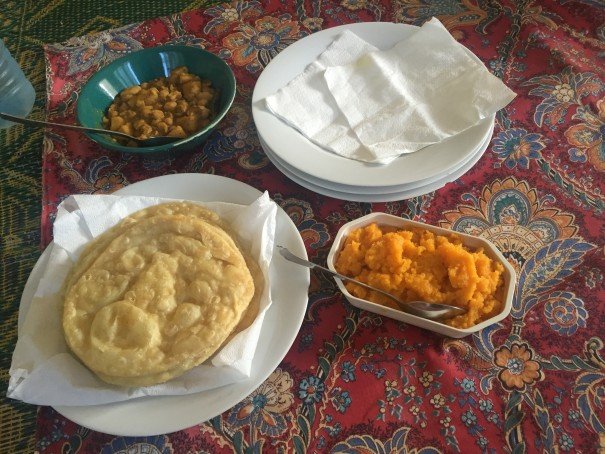
The Joyous Breakfast of Large‑Hearted People

The Joyous Breakfast of Large‑Hearted People
Halwa in Negombo
One Sunday, a few weekends ago, my husband and I found ourselves deep in the heart of Negombo, a seaside town that skirts Colombo’s international airport. Better known for its narrow strip of bars and restaurants that offer jetlagged tourists a taste of Sri Lanka’s laid-back vibe, Negombo has, in recent times, also become an unlikely refuge for another sort of traveller. Fleeing sectarian and gang violence in their native country, several Pakistani Christian families seeking refugee status have found peace—and a sense of community—in the rustic bylanes of Negombo, dotted with Christian shrines at several corners. Only a couple of days earlier, I had become acquainted with one such family. True to the mehmaan nawazi—or no-holds-barred hospitality—in which Pakistanis take pride, they invited me home to break bread with them.
That’s how we found ourselves in their sparsely appointed home, listening to the matriarch of the family recount how they were forced to abandon their middle-class lives in Karachi and flee to this corner of Sri Lanka. It had been six years since they first arrived. After the UNHCR, the United Nations’ refugee agency, rejected their application for asylum twice, they were now technically illegal immigrants, unable to work, loath to return, and living in constant dread of deportation.
As we took in the story, marked by gun violence and battle scars, the members of the large family scurried into action. One daughter furnished a chintz-print tablecloth to drape over the tatty dhurries we sat on, while another vanished into the kitchen and emerged bearing a plate of puris: puffy, golden, deep-fried bread that is a beloved breakfast item in Pakistan (and much of the Indian subcontinent). The puris were paired with classic sweet-and-savory accompaniments: a rich, orange-hued halwa made of semolina, sugar, and a generous helping of ghee, and chanay, or chickpeas, cooked until the chalky outer skin had been coaxed into silken submission.
We tore off bits of the saucer-sized puris and scooped up alternating bites of the halwa and chanay, the sweetness of one muted by the rich, spice-laden savoriness of the other. My husband recounted eating a similar breakfast in Karachi several years ago and for a few moments, reveling in the nostalgic comfort of familiar flavors, all felt okay, in our world and theirs.
In the weeks that followed, I would often think back to that morning, when we were offered a rare window into lives that would put the comfort of ours firmly in perspective. My journalistic instinct would prompt me to question some parts of the story, to prod them to see if they shook loose. But looking back, my cynicism is always tempered by the memory of that generous feast. A breakfast of halwa-puri is meant to be a joyous, celebratory one. To offer to share it when one has so little—that requires a large heart.